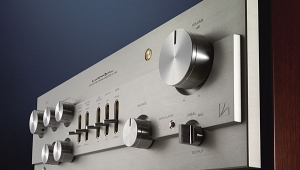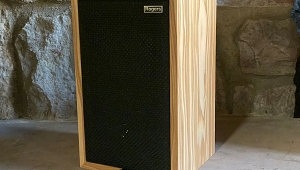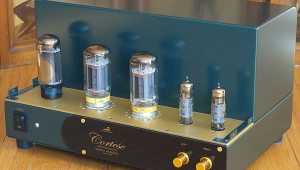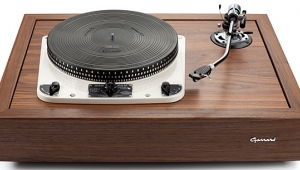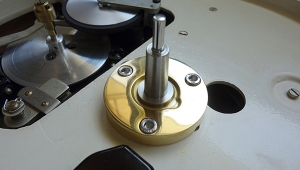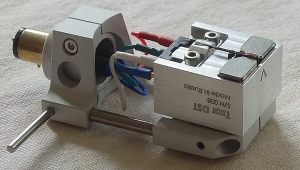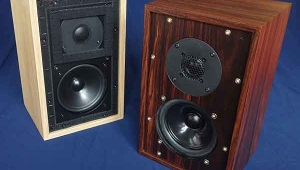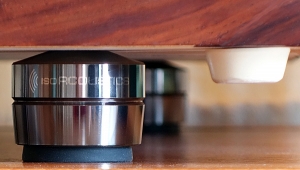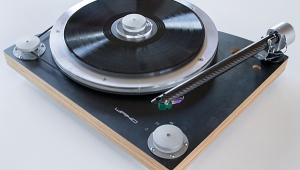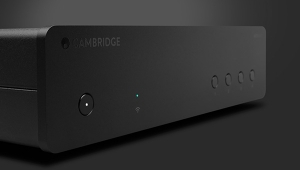| Columns Retired Columns & Blogs |
Listening #24 Page 2
The idea, which you've probably envisioned by now, is that the balls allow the Cloud 10 to shrug off airborne and structural vibrations in virtually any direction—vertical, lateral, rotational—whereas spikes, squishy feet, and springs are much more limited in the ways they can move. That the low-mass Cloud 10 also tends not to store energy puts it at an even greater advantage over its comparatively ox-like competitors.
Footnote 1: Lately I've taken to raiding the Kable Kloset when I need new batteries for my garage-door opener.
At HE2004E, Gingko Audio's Vinh Vu used a pair of B&K accelerometers and a laptop computer loaded with spectral-analysis software to prove that his Cloud 10 had an effect—a positive one—on the audible performance of the amplifier placed atop it. And now I've heard the same thing at the home of fellow upstate New Yorker Sasha Matson, a composer and music professor who also writes about audio gear for Positive Feedback Online: A Gingko Cloud 10 platform underneath his Rega Planar 25 turntable makes a true man-on-the-street difference for the better.
Gingko's standard Cloud 10 measures 18" by 14" and sells for $299, in clear acrylic or black. Buy the black if you must, but my preference is for the clear. (Gingko also sells a polishing compound that will help keep your clear Cloud 10 looking new, so if you're worrying about scratches, don't.)
There's one other affordable accessory that could benefit the majority of Stereophile's readers, and that's the Eichmann Bullet Plug, a fairly recent innovation that can safely claim to be the only really different RCA connector on the market.
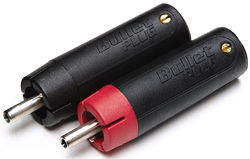 In designing the Bullet Plug, Australian Keith Eichmann followed the same path as Englishman Denis Morecroft, whose research into eddy currents and impedance reflections led to the remarkable DNM range of electronics and cables (see the May 2004 Stereophile, Vol.27 No.5), wherein virtually every part that doesn't need to conduct electricity is made from something other than metal. Eichmann's specific aim was to create a high-quality phono plug that contains only enough metal to faithfully carry the signal—and no more. The result is a clever design in which the hot signal is conducted by a hollow rather than solid pin, and where a smaller, solid pin at the connector's periphery takes the place of an unnecessarily massive ground sleeve. Nor are the solder tabs for the Bullet Plugs any more massive than they need to be. All metal used is copper telluride—an otherwise pure copper to which a small amount of tellurium has been added to enhance machinability—rather than the usual junky brass. The plating is high-purity gold, applied directly to the copper without the usual nickel substrate, and the rest of the Bullet Plug is machined from a tough, lightweight polymer. This is not your mother's (audio) jewelry.
In designing the Bullet Plug, Australian Keith Eichmann followed the same path as Englishman Denis Morecroft, whose research into eddy currents and impedance reflections led to the remarkable DNM range of electronics and cables (see the May 2004 Stereophile, Vol.27 No.5), wherein virtually every part that doesn't need to conduct electricity is made from something other than metal. Eichmann's specific aim was to create a high-quality phono plug that contains only enough metal to faithfully carry the signal—and no more. The result is a clever design in which the hot signal is conducted by a hollow rather than solid pin, and where a smaller, solid pin at the connector's periphery takes the place of an unnecessarily massive ground sleeve. Nor are the solder tabs for the Bullet Plugs any more massive than they need to be. All metal used is copper telluride—an otherwise pure copper to which a small amount of tellurium has been added to enhance machinability—rather than the usual junky brass. The plating is high-purity gold, applied directly to the copper without the usual nickel substrate, and the rest of the Bullet Plug is machined from a tough, lightweight polymer. This is not your mother's (audio) jewelry.
A few weeks ago I received some Bullet Plug samples to try at home, and my first thought was to dig two identical pairs of interconnects out of my big Kable Kloset (footnote 1), replace the RCAs on one set with the Eichmanns, and listen for a difference. The soldering wasn't terribly hard to do, thanks in equal parts to the instructions that come packaged with the plugs, and some additional installation tips I found on Eichmann's website. Just let me remind you that Primedia Enthusiast Media cannot be held liable for death or personal injuries incurred while using a hot soldering iron to carry out my whims.
I compared the stock and Bulleted cables in two applications: going from my Sony SCD-777ES SACD player to my Fi preamp's line inputs, and going from my Audio Note AN-S2 moving-coil step-up transformer and the same preamp's phono inputs. I can't tell you, hand on heart, that the standard Bullet Plugs made a night-and-day, man-on-the-street, or other-such-hyphenated difference in the sound of my system. Although I've come away from the Bullet Plug experience convinced that they do, in the aggregate, make a difference for the better, I would be the last to deny that the changes I heard may well have been nothing more than the changes I wanted to hear.
That said, I'll tell you that the Bullet Plugs resulted in a smally more open and explicit sound. Details were easier to catch—the way a guitar player rakes his pick across the strings during the chorus of "Kare Kare," from the Crowded House's Together Alone, for instance (Capitol 27048 2)—and the soundfield seemed deeper, more open, and more inviting. I didn't hear any musical differences per se: pitch and rhythm information was either good or bad, as before, and there weren't any changes in flow or momentum, or even overall expressiveness—unless, of course, you want to count the fact that Glenn Gould's singing in the 1981 Goldberg Variations seemed easier to hear (Sony Classical S3K 87703).
But all that was with the standard copper Bullet Plugs. Eichmann also sent me a set of their Silver Bullet Plugs, which are made from four-nines silver, treated with a microscopically thin Caig Labs protectant—and these went right onto my homemade solid-core silver cables. In doing so they replaced a set of RadioShack's cheapest RCA plugs, which I'd chosen for reasons of their own relatively low mass (while pretending not to notice how badly they're made).
This time, the installation was even easier—the solder tab for the ground contact in particular is much friendlier toward a thin, solid wire than a fat bunch of strands—and the difference was more audible: clearer, more explicit, and, remarkably, even smoother. Less than man-on-the-street, but more than just voice-in-my-head.
The price? A set of four Eichmann Bullet Plugs goes for $40 in copper, $99 in silver. I think that's pretty darn reasonable—so much so that I plan never to make another set of silver cables with anything less. For everyday cables, consider buying some solid-core wire and making your own cables with the copper Bullets. But I'd also suggest that people who neither know nor wish to know how to solder can enjoy almost the same combination of fun and thrift with a 1-meter pair of DNM Interconnects ($125), the RCA versions of which come with Eichmann Bullet Plugs already installed.
Are you still with us, ladies?
I hope so, because there's one more recommendation to make. Now that you know what to get the person who has CDs but no LPs, the person who has LPs but no CDs, and the person who already has a good but not quite great music system, the only question left is: What do you get the person who has nothing?
This isn't about politics or religion: Difficult though it is for some to imagine, there are millions of people right here in America who don't care about transubstantiation or the second amendment for the simple reason that they're hungry—literally starving. That so many of them are children is nothing less than a national disgrace.
These people, wherever and whomever they may be, are your brothers and sisters, and those of you who think that caring for them is the sole province of "lefties" can go screw yourselves. The rest of you—the decent people—can fish out your credit cards right now and visit www.foodforthepoor.org. Think of the highest number you can afford to donate, triple it, and click Send. It's almost as easy as soldering, and, as with all such things, you have my personal guarantee that it will make your soundstage deeper, instrumental colors in the upper midrange will bloom like never before, and the Adagio of Hartmann's Symphony 2 will begin to make sense. Giving is the ultimate tweak.
And now, in some parallel universe, Della has sold her record collection in order to buy Jim the serenely beautiful 47 Lab Shigaraki D/A converter for his digital front end ($1480), and Jim has sold off his CDs so he can buy Della a Loricraft PRC-3 record-cleaning machine ($2095 in mahogany, which Della prefers). And by now they've realized that they get at least as much pleasure listening to the car radio, especially when they can't guess what song's coming next, and especially when they hold hands. Of all who give gifts, they were the wisest.
Merry Christmas.
Footnote 1: Lately I've taken to raiding the Kable Kloset when I need new batteries for my garage-door opener.
- Log in or register to post comments

